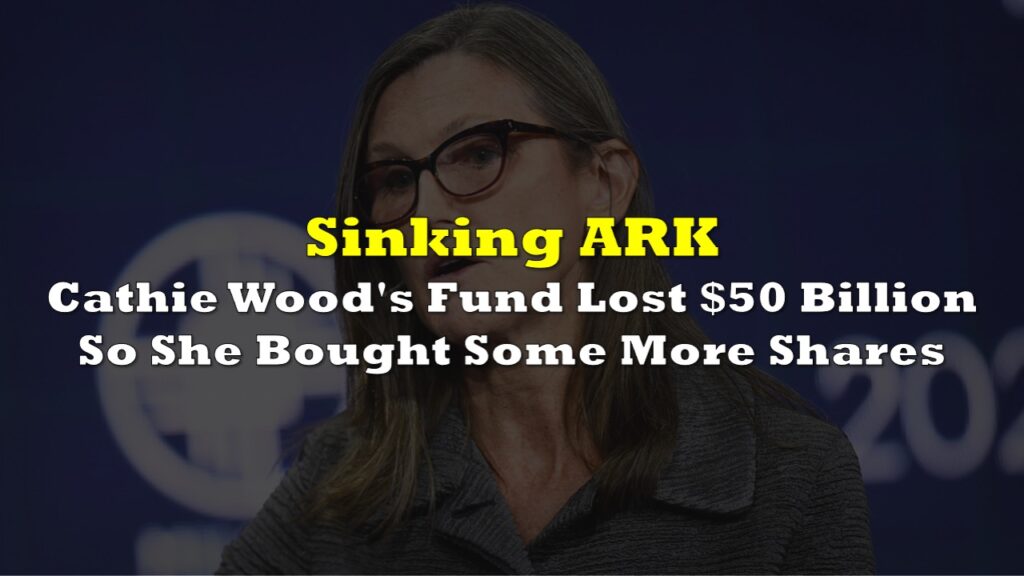Cathie Wood’s Ark Investment Management has unveiled an intriguing strategy to allay concerns stemming from the significant losses the asset manager has incurred due to rising interest rates – an ingenious approach involving tax write-offs.
Ark’s flagship investment offering, the $6.3 billion ARK Innovation Exchange Traded Fund (NYSE: ARKK), has witnessed a decline of more than 25% over the past three months, according to Morningstar. Despite being up approximately 17% since the beginning of the year, ARKK has generated a dismal annualized three-year return of -28%, primarily due to its tumultuous journey in 2022 when it plunged by about 67%.
In the wake of these substantial losses, Ark is assuring its investors that they are unlikely to face tax liabilities on capital gains distributions through ARKK and Wood’s other actively managed ETFs for at least the next two years.
“This means that current and future shareholders of ARK ETFs can remain invested in disruptive innovation in a compounded fashion, without being taxed, for potentially two more years or longer,” explained an Ark research note by Director of Financial Reporting and Fund Accounting, Rob Kamentsev.
The anticipated tax relief is a result of both the magnitude of Ark’s losses and the unique structure of ETFs, which hold securities similar to mutual funds but trade on exchanges like stocks, affording them distinct tax benefits.
In essence, the billions of dollars in losses sustained by Ark’s ETFs since early 2022 can be gradually used to offset net taxable gains distributed to shareholders, as per Wood’s company.
$ARKK https://t.co/CrIdG5SVb6 pic.twitter.com/S2R55kaRzW
— Kenneth Dredd (@KennethDredd) October 22, 2023
During Ark’s quarterly fund webinar, held on Thursday, the company indicated that its estimate of December 2025 was conservative, suggesting that its capital losses could potentially offset tax liabilities as far out as September 2027.
Despite a few notable holdings in ARKK, such as Zoom and Block, experiencing a challenging year, other assets like Coinbase and Roku have performed more robustly. Tesla, a perennial top holding, has surged by nearly 100 percent year to date, although its stock remains below its late 2021 and early 2022 highs.
Cathie Wood emphasized during the webinar that the tax-saving potential offered by her company’s ETFs was underappreciated, stating, “I don’t think many people understand what an asset we have in terms of those tax-loss carry-forwards.”
Ark, which did not report any income or capital gain distributions in 2022 after doing so in 2021, did not provide additional comments in response to requests.
ETFs are often favored by investors for their ability to manage holdings to defer capital gains tax liabilities. While ETF providers routinely tout the various tax advantages of their products over other US fund types, Ark’s decision to highlight the tax benefits of its losses and provide an estimated timeline for tax advantages is less common, even for a group led by a founder known for making bold predictions.
Todd Rosenbluth, Director of Research at the VettaFi consultancy, noted, “They are aiming for transparency, but they are making forward-looking projections — that’s abnormal to see in asset management.” He added, “The specific timing and putting a more positive spin on the challenging historical performance stands out relative to other ETFs.”
This is not the first time that Wood pointed out this silver lining in her exchange-traded funds’ terrible run. In March, she told in an interview has over $2 billion in losses from selling stocks during the market crash. By selling stocks at a loss, Wood’s funds can now reduce and potentially offset the tax payment on future capital gains.
“It’s over $2 billion right now against which we can take future gains and then concentrate towards our highest-conviction names,” Wood said at the time.
Wood noted that as her flagship fund’s holdings declined from their peak in February 2021, they went from more than 50 to just 28 stocks.
According to Morningstar data, total assets across Ark’s nine ETFs have fallen to $11.4 billion from a high of $60.3 billion in February of last year. This was driven by severe drops in its flagship Ark Disruptive Innovation ETF, known as ARKK, which has lost over two-thirds of its value this year and is on course to have its worst yearly performance.
Wood’s ARKK was deemed the “worst-performing fund” in Q1 2022 by Morningstar.
Information for this briefing was found via Financial Times and the sources mentioned. The author has no securities or affiliations related to this organization. Not a recommendation to buy or sell. Always do additional research and consult a professional before purchasing a security. The author holds no licenses.









